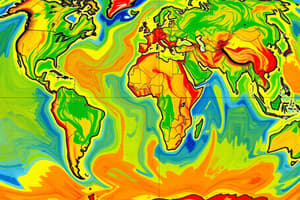Podcast
Questions and Answers
What is the primary factor that determines the concentration of energy from the sun at a particular location?
What is the primary factor that determines the concentration of energy from the sun at a particular location?
- The location's altitude above sea level
- The location's proximity to the coastline
- The location's distance from the equator (correct)
- The location's longitude
Which of the following locations would receive the most concentrated energy from the sun?
Which of the following locations would receive the most concentrated energy from the sun?
- A location at 30° latitude
- A location at 0° latitude (correct)
- A location at 60° latitude
- A location at 90° latitude
Why do places at higher latitudes tend to have colder climates?
Why do places at higher latitudes tend to have colder climates?
- Because they receive less concentrated energy from the sun (correct)
- Because they receive more direct energy from the sun
- Because they are farther from the moderating influence of the ocean
- Because they receive more scattered energy from the sun
What is the unit of measurement for latitude?
What is the unit of measurement for latitude?
What is the general relationship between latitude and climate?
What is the general relationship between latitude and climate?
What is the primary reason for the difference in temperature between higher and lower altitudes?
What is the primary reason for the difference in temperature between higher and lower altitudes?
What is the effect of bodies of water on the nearby land during winter?
What is the effect of bodies of water on the nearby land during winter?
Why do places closer to the equator tend to have warmer climates?
Why do places closer to the equator tend to have warmer climates?
What is the relationship between air density and temperature?
What is the relationship between air density and temperature?
What is the primary effect of ocean currents on climate?
What is the primary effect of ocean currents on climate?
Flashcards are hidden until you start studying
Study Notes
Latitude and Climate
- Latitude measures how far north or south a place is from the equator, and is measured in degrees.
- Places closest to the equator (0º latitude) receive more concentrated, direct energy from the sun.
- Areas at higher latitudes (farther from the equator) receive energy from the sun that is spread over a larger area and is less concentrated.
- Lower latitudes tend to have warmer climates than higher latitudes.
Altitude and Climate
- Altitude affects local climate, with temperatures becoming cooler as altitude increases.
- This is due to air density, with air molecules being spaced farther apart at higher altitudes, making the air less dense.
- At lower altitudes, air molecules are closer together, making the air more dense, and trapping heat, resulting in warmer temperatures.
Bodies of Water and Climate
- Bodies of water take a long time to heat up or cool down compared to the surrounding land.
- This helps keep nearby temperatures from becoming too extreme.
- In winter, heat from bodies of water warms the air above, which then blows over the land, warming it.
Studying That Suits You
Use AI to generate personalized quizzes and flashcards to suit your learning preferences.




